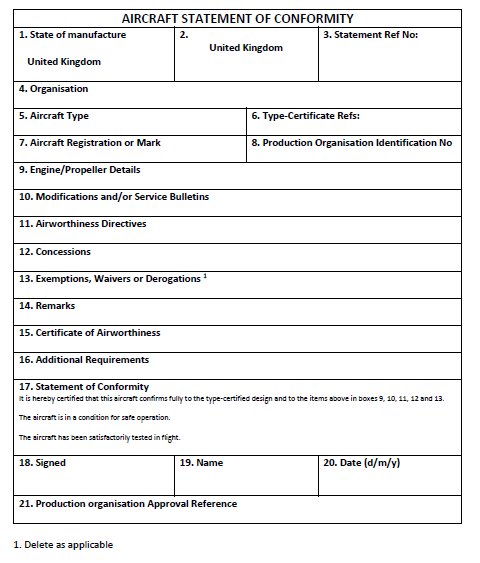Appendix VIII — CAA Form 52 Aircraft statement of conformity
SI No. 588/2023

CAA Form 52, Issue 1
Instructions for the use of the Aircraft Statement of Conformity CAA Form 52
1. PURPOSE AND SCOPE
- Use of the aircraft Statement of Conformity issued by a manufacturer producing under Part 21 Section A Subpart F is described under point 21.A.130 and the corresponding acceptable means of compliance.
- The purpose of the aircraft Statement of Conformity (CAA Form 52) issued under Part 21 Section A Subpart G is to enable the holder of an appropriate production organisation approval to exercise the privilege to obtain an individual aircraft certificate of airworthiness from the CAA.
2. GENERAL
- The Statement of Conformity must comply with the format attached including block numbers and the location of each block. The size of each block may however be varied to suit the individual application, but not to the extent that would make the Statement of Conformity unrecognisable. If in doubt consult the CAA.
- The Statement of Conformity must either be pre-printed or computer generated but in either case the printing of lines and characters must be clear and legible. Pre-printed wording is permitted in accordance with the attached model but no other certification statements are permitted.
- Completion may be either machine/computer printed or hand-written using block letters to permit easy reading in English.
- A copy of the Statement and all referenced attachments are to be retained by the approved production organisation.
3. COMPLETION OF THE STATEMENT OF CONFORMITY BY THE ORIGINATOR
- There should be an entry in all blocks to make the document a valid statement.
- A Statement of Conformity may not be issued to the CAA unless the design of the aircraft and its installed products are approved.
- The information required in blocks 9, 10, 11, 12, 13 and 14 may be by reference to separate identified documents held on file by the production organisation, unless the CAA agrees otherwise.
- This Statement of Conformity is not intended to include those items of equipment that may be required to be fitted in order to satisfy applicable operational rules. However, some of these individual items may be included in block 10 or in the approved type design. Operators are therefore reminded of their responsibility to ensure compliance with the applicable operational rules for their own particular operation.
Block 1 Enter name of the State of manufacture. Block 2 [...] Block 3 A unique serial number should be pre-printed in this block for statement control and traceability purposes. Except that in the case of a computer generated document the number need not be pre-printed where the computer is programmed to produce and print a unique number. Block 4 The full name and location address of the organisation issuing the statement. This block may be pre-printed. Logos etc. are permitted if the logo can be contained within the block. Block 5 The aircraft type in full as defined in the type-certificate and its associated data sheet. Block 6 The type-certificate reference numbers and issue for the subject aircraft. Block 7 If the aircraft is registered then this mark will be the registration mark. If the aircraft is not registered then this will be such a mark that is accepted by the CAA and, if applicable, by the competent authority of a third country. Block 8 The identification number assigned by the manufacturer for control and traceability and product support. This is sometimes referred to as a Manufacturers Serial No or Constructors No. Block 9 The engine and propeller type(s) in full as defined in the relevant type-certificate and its associated data sheet. Their manufacturer identification No and associated location should also be shown. Block 10 Approved design changes to the aircraft definition. Block 11 A listing of all applicable airworthiness directives (or equivalent) and a declaration of compliance, together with a description of the method of compliance on the subject individual aircraft including products and installed parts, appliances and equipment. Any future compliance requirement time should be shown. Block 12 Approved unintentional deviation to the approved type design sometimes referred to as concessions, divergences, or non-conformances. Block 13 Only agreed exemptions, waivers or derogations may be included here. Block 14 Remarks. Any statement, information, particular data or limitation which may affect the airworthiness of the aircraft. If there is no such information or data, state; ‘NONE’. Block 15 Enter ‘Certificate of Airworthiness’, or ‘Restricted Certificate of Airworthiness’, or for the Certificate of Airworthiness requested. Block 16 Additional requirements such as those notified by an importing country should be noted in this block. Block 17 Validity of the Statement of Conformity is dependent on full completion of all blocks on the form. A copy of the flight test report together with any recorded defects and rectification details should be kept on file by the POA holder. The report should be signed as satisfactory by the appropriate certifying staff and a flight crew member, e.g. test pilot or flight test engineer. The flight tests performed are those defined under the control of the quality system, as established by point 21.A.139 in particular 21.A.139(b)(1)(vi), to ensure that the aircraft conforms with the applicable design data and is in condition for safe operation.The listing of items provided (or made available) to satisfy the safe operation aspects of this statement should be kept on file by the POA holder. Block 18 The Statement of Conformity may be signed by the person authorised to do so by the production approval holder in accordance with point 21.A.145(d). A rubber stamp signature should not be used. Block 19 The name of the person signing the certificate should be typed or printed in a legible form. Block 20 The date the Statement of Conformity is signed should be given. Block 21 The CAA approval reference should be quoted.